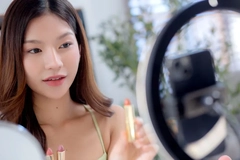
In tandem with the launch of its growth factor serum, The Ordinary has started a skin care science accessibility campaign that aims to demystify common ingredients and safety myths surrounding personal care products.
The GF 15% Solution is a water-based, age-support serum containing 15% growth factors. Growth factors are a group of proteins that stimulate tissue growth and help regenerate the skin surface.
Rather than solely launching the new product, The Ordinary says it is also launching a campaign to democratize quality skin care through cosmetic information transparency.
The Truth Should Be Ordinary campaign includes white papers and short videos about recurring skin care topics. The site currently features content on subjects like the differences — and similarities — between chemical and mineral sunscreen, animal testing, the safety of parabens in cosmetics, and myths about natural ingredients being intrinsically nontoxic.

“We think it’s time for a skin care ‘miracle’: Not something which smooths or plumps, but which clarifies the entire beauty industry. So as we share our new innovation, we’re also dispelling mistruths, showcasing and explaining scientific papers which tackle common skin care myths,” says the campaign website.
The campaign was designed in partnership with creative studio Uncommon and digital design and technology studio Wild. Together, the brands devised a microsite separate from The Ordinary’s main shopping page based on the information campaign.
“By linking the launch of this groundbreaking product with a platform that promotes clarity and accessibility, we’re making both skin care and the beauty industry more honest and inclusive for everyone,” says the Wild team about the collaboration.
Ordinary science communication
The microsite’s topic pages walk customers through the initial skin care-related concerns or myths, then highlight the available research about the topic, plus any relevant regulatory rulings on ingredient safety.
For example, the page about parabens in cosmetics states: “Overall, the scientific evidence suggests that parabens are safe to use in cosmetics at the current levels allowed. Independent groups of experts around the world, like the Scientific Committee on Consumer Safety in Europe and the Cosmetic Ingredient Review Expert Panel in the US, have assessed the safety of parabens based on a large amount of scientific data and considering daily exposure through multiple products.”
The page concludes, “While it’s good to be aware of the ingredients in the products we use, the evidence shows that parabens are not a major cause for concern when used in cosmetics at the levels currently permitted.”
The site’s leading voice is Dr. Bushra Yusuf, a science communicator and associate manager of science communication at Deciem, The Ordinary’s parent company. Yusuf appears in short videos on each page, adding insight into the research and communication challenges surrounding these topics that may contribute to skin care misconceptions.
Increasing transparency
The Ordinary’s science communication approach falls under a broader transparency umbrella where companies are sharing information to gain customer trust and loyalty.
Chemical supplier Clariant has just made its product carbon footprint data openly accessible to customers via the digital platform ClariHub. The company aims to improve environmental transparency and help enable its customers to calculate their carbon footprints with this data.
Pia Klee, head of sustainability transformation at Clariant, told Personal Care Insights: “Among the first companies in our industry, we make our product carbon footprint data readily available to customers without requiring non-disclosure agreements or charging fees for access. This open approach reflects our belief that environmental transparency is essential for driving industry-wide sustainability progress.”
With this drive toward data transparency, regulatory bodies are becoming more stringent about companies’ environmental claims. The UK’s Competition and Markets Authority (CMA) had opened an investigation into Unilever for potentially misleading environmental claims while marketing its products.
The CMA investigation closed a year later after Unilever adjusted its product claims, though specifics were never disclosed about the original claims or resolution.













